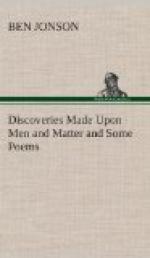De vere argutis.—I do hear them say often some men are not witty, because they are not everywhere witty; than which nothing is more foolish. If an eye or a nose be an excellent part in the face, therefore be all eye or nose! I think the eyebrow, the forehead, the cheek, chin, lip, or any part else are as necessary and natural in the place. But now nothing is good that is natural; right and natural language seems to have least of the wit in it; that which is writhed and tortured is counted the more exquisite. Cloth of bodkin or tissue must be embroidered; as if no face were fair that were not powdered or painted! no beauty to be had but in wresting and writhing our own tongue! Nothing is fashionable till it be deformed; and this is to write like a gentleman. All must be affected and preposterous as our gallants’ clothes, sweet-bags, and night-dressings, in which you would think our men lay in, like ladies, it is so curious.
Censura de poetis.—Nothing in our age, I have observed, is more preposterous than the running judgments upon poetry and poets; when we shall hear those things commended and cried up for the best writings which a man would scarce vouchsafe to wrap any wholesome drug in; he would never light his tobacco with them. And those men almost named for miracles, who yet are so vile that if a man should go about to examine and correct them, he must make all they have done but one blot. Their good is so entangled with their bad as forcibly one must draw on the other’s death with it. A sponge dipped in ink will do all:-
“—Comitetur Punica librum Spongia.—” {44a}
Et paulo post,
“Non possunt . . . multae . . . liturae . . . una litura potest.”
Cestius—Cicero—Heath—Taylor—Spenser.—Yet their vices have not hurt them; nay, a great many they have profited, for they have been loved for nothing else. And this false opinion grows strong against the best men, if once it take root with the ignorant. Cestius, in his time, was preferred to Cicero, so far as the ignorant durst. They learned him without book, and had him often in their mouths; but a man cannot imagine that thing so foolish or rude but will find and enjoy an admirer; at least a reader or spectator. The puppets are seen now in despite of the players; Heath’s epigrams and the Sculler’s poems have their applause. There are never wanting that dare prefer the worst preachers, the worst pleaders,




